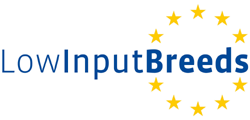Pictures from the 1st LowInputBreeds Symposium
 |
 |
 |
 |
 |
Contact
Dr. Ferry Leenstra
Wageningen UR Livestock Research
Postbus 65
8200 AB Lelystad
The Netherlands
Tel. + 31 320 238517
Fax + 31 320 238050
E-mail ![]() ferry.leenstra@no-spam.wur.nl
ferry.leenstra@no-spam.wur.nl
Internet www.livestockresearch.wur.nl ![]()
First LowInputBreeds Symposium: Report
On March 15 and 16, 2011 the first LowInputBreeds symposium was organized in cooperation with ECO AB, the European Consortium for Organic Animal Breeding in the Hof van Wageningen, The Netherlands.
The programme including the abstracts and presentations of the papers presented are available on this homepage under "programme".
Over 50 participants (researchers, policy makers and farmers) participated in plenary lectures, discussions and species specific workshops. Central theme in the symposium was: ‘low input, niche or model for future livestock production?’ with attention paid to ethical issues.
On March 15, the participants were welcomed by Veronika Maurer (FiBL), the scientific coordinator of the LowInputBreeds project. In the first plenary session Karsten Klint Jensen (Danish Centre for Bioethics and Risk Assessment) introduced the theme and set the scene for the discussions in the species specific workshops. Jozsef Ratky (Research Institute on Animal Breeding, Hungary) discussed the effects and risks of different reproduction methods in breeding and Jack Windig (Wageningen UR Livestock Research) discussed the risks, benefits and alternatives of genomic selection. In a joint paper Wytze Nauta and Anet Spengler Neff (ECO AB) discussed the organic perspective on breeding and reproduction in livestock production.
For the first workshop participants split up according to their species of interest: cattle, sheep, pigs and poultry. Each workshop considered the aims and outputs of the LowInputBreeds project within the context of ethics including comment by invited scientists from outside the project. Identified ethical issues were explored further in the second set of workshops on March 16.
In a second plenary session Anne-Marie Neeteson of the European Forum of Farm Animal Breeders (EFFAB) and FABRE TP gave a view on breeding goals in relation to current and future livestock production and Irene Hoffmann (FAO) discussed (agro)biodiversity in animal production and food security. Marijke de Jong (Dutch Society for Animal Protection) discussed welfare in livestock production and how specific labeling might increase consumers’ awareness of animal friendly, low input systems. The last speaker in this session was Tom Dedeurwaerdere (University of Louvain) presenting first results on utilization of resources in low input livestock systems.
March 16 started with a plenary session on climate change and food security. Jorgen Elvind Olesen (Aarhus University) discussed the role of livestock production in climate change and Carlo Leifert (Newcastle University) presented views on food production in relation to utilization of resources. Discussion was lively, occasionally furious, on identifying region and farm specific aspects and especially the need for a fundamental change of mind set in mainstream agriculture.
These ideas and other ethical issues listed the day before formed the basis of the second set of species workshops, identifying how they will be accommodated in future plans in the LowInputBreeds project.
Feedback from workshops opened the last plenary session and was reflected on by Anet Spengler Neff and Wytze Nauta offering an organic perspective. Anne Sophie Lequarre (EU project officer for LowInputBreeds) finished with an overview of the structure and role of the EU in relation to livestock research. The output of the workshops will be elaborated on by Karsten Klint Jensen and co-workers for the across species activities of LowInputBreeds.
LowInputBreeds had its second general assembly during the meeting and ECO AB its annual general meeting.
Author: Ferry Leenstra, Wageningen UR, Livestock Research
 This website was archived on December 19, 2017 and is no longer updated.
This website was archived on December 19, 2017 and is no longer updated.


